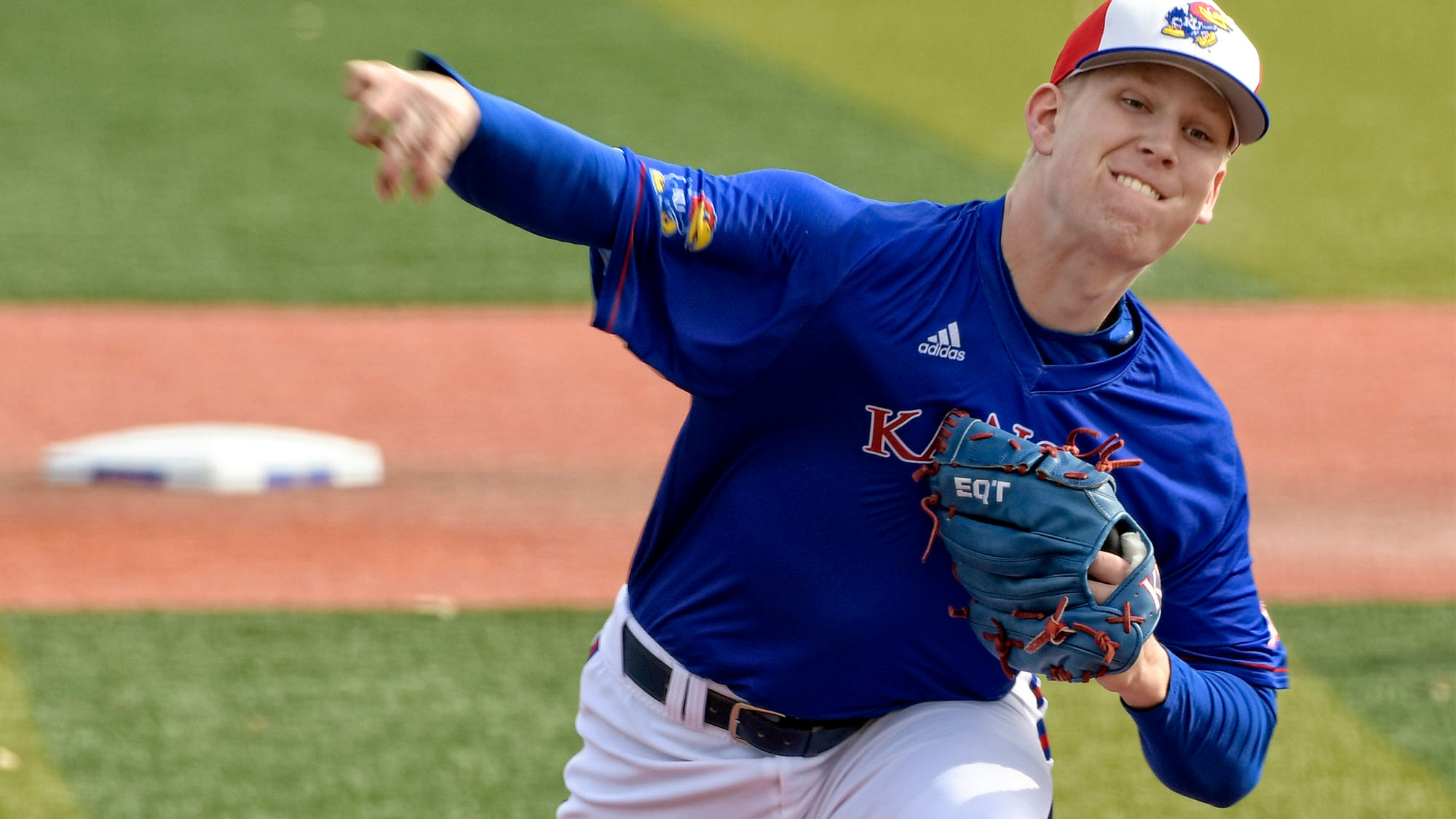BROOKLYN, N.Y. – Ryan Zeferjahn and Jaxx Groshans spent three seasons playing college baseball for the University of Kansas. They figured their days as teammates would come to an end once they entered the MLB draft.
But in a surprising twist of fate, the Boston Red Sox took Zeferjahn and Groshans in the third and fifth rounds, respectively. The Red Sox assigned each of them to their short-season affiliate in Lowell, Massachusetts where their careers will continue on the same trajectory.
“It’s been cool to be a part of this, obviously,” Zeferjahn said, “We both thought it was going to be our last game in the Big 12 Tournament. I got the call in the third round, and while I was hanging out with my family, I turned to Twitter, and saw that Jaxx was taken in the fifth round by the same team.
“It was kind of cool because we had a good bond in Kansas as a pitcher and catcher battery and now it’s pretty cool to play with him again in pro ball.”
“I was actually at home with my family enjoying draft day. My brother was down in Florida on the injured list for quite some time. We were all back in my house back in Houston,” Groshans added.
“It’s funny and coincidental how Zeferjahn and I ended up here together with the Red Sox. I was in the dugout, and I was talking about it during our conference tournament. I said our time in Kansas was going to come to an end, so how cool would it be to be on the same team in the future. I did not expect it to become a reality.”
Scouting takes various evaluators to different parts of the country with the scant hope of uncovering the next future standout. In recent years, finding college teammates on the same roster of an organization is more common.
Recent examples of this trend are Stanford alums Quinn Brodey and Matt Winnaker in the New York Mets farm system and Vanderbilt’s Julian Infante and Zach King in the Miami Marlins pipeline.
“I met with our scouting director and our assistant scouting director when Kansas was playing St. John’s up in Queens, (New York),” Groshans said. “A bunch of the Red Sox scouting department was there watching us play.
“Zeferjahn was pitching, and I was catching, so I think that was when I had the general idea that Boston had an eye on us. That being said, a lot of currents fall a different way than you think you will, but I was glad that Boston came into the picture and Zeferjahn does too.”
Some teams will target a specific state or area for scouting and develop a reputation for discovering amateur prospects in the region. Ray Fagnant, a former minor league catcher, serves as the northeast regional scout for the Red Sox and identified Nick Decker and Jay Groome as high school talents in New Jersey.
Franklin Pierce University, a school in Rindge, New Hampshire, developed four future Mets prospects in the past decade. Having the same talent evaluators in one spot creates a more likely scenario for college teammates, such as Zeferjahn and Groshans, to play for the same team at the pro level.
“You always see scouts at the games, so I knew that everyone was interested in Jaxx and me,” Zeferjahn said. “The Big 12 has a lot of big-time players.
“There’s always guys who are watching these games. At the same time, I had no idea that the Red Sox would take me, but Jaxx said they were there and I threw well in front of them.”
While the shift to the professional game lessens with familiarity, a semblance of a learning curve remains a part of the process. For Groshans, the jump to the minor leagues wasn’t entirely an unknown endeavor.
He watched his younger brother Jordan, a shortstop in the Blue Jays system become a first-round pick in the 2018 draft. Zeferjahn also reached out to players who are in the minor leagues to help him ease into his new surroundings along with the heightened expectations.
“My brother is obviously a huge influence on my career. He is my younger brother, but as far as maturity goes he’s more advanced than just about anybody I have met in this game,” Groshans said.
“He has a very mature approach to how he handles everything. That includes on the field as well as off the field. The first thing he told me after I was drafted was to enjoy the moment. “
“There are some guys who are already in the minor leagues that I bounced ideas off of here and there,” Zeferjahn said. “It’s really been helpful since they have been through it, especially now that I have been struggling. But it’s a learning process in my first year in pro ball because things are a lot different. It’s about understanding the process.”
Zeferjahn and Groshans made significant strides during their three years at Kansas rounding out their play to successfully compete in the Big 12 Conference. After earning All-Big 12 second-team honors as a sophomore, Zeferjahn followed up with his most productive college season on the mound with career bests in ERA (3.37), strikeouts, (101), and WHIP (1.14).
He also held the opposition to a .193 batting average. Groshans made similar gains as a junior, slashing .333/.469/.602 with a 1.071 OPS. Most importantly, he had ten more walks than strikeouts and improved his skills on defense. Both players express gratitude to Ritch Price for their cumulative growth.
“Jaxx caught me a lot at Kansas,” Zeferjahn said. “He is kind of an emotional player, and I’m kind of the opposite, so being able to throw to him every game is really special.
“The things he did this year were very impressive. He went off at the plate, and that is where he is today. Our skip Ritch Price is one of the best in the business. He treats us like pro guys with the experience we had this year. That really helped us both.”
“Ritch Price helped me out with strides,” Groshans said. “A lot of people didn’t know that I actually signed with the University of Texas, but my scholarship got revoked because of the coaching change.
“Coach Price gave me an opportunity to play college baseball when a lot of people wouldn’t. He taught me a lot about being a good human being, in addition to being a good baseball player.”
The relationship between a pitcher and catcher is a bond developed through constant repetition and adjustments on the diamond. Zeferjahn worked with Groshans on maintaining a repeatable delivery and throwing his fastball, slider, curveball, and changeup for strikes while refining his overall command.
Groshans, on his end, focused on getting a better sense of the strike zone as a hitter by seeing more pitches and driving the ball to all fields. Behind the plate, he focused on throwing out potential base stealers and furthering his ability as the game caller for a pitching staff.
“A pitcher and catcher must be on the same page at all times,” Zeferjahn explains. “After three years, he knows exactly what I’m thinking and what pitch I want to throw.
“It’s kind of hard for him with new pitchers since there is a bit of a transition. Obviously, he caught me in my first game in the pros. It’s very good for a pitcher and a catcher to stay together and click and have each other’s brains picked.”
“Working with my catching coordinator and with manager Luke Montz at Lowell, my pitch calling has improved,” Groshans said. “My receiving, my pre-pitch set up, and my throwing have all been better. I think every aspect of my catcher is improved. I feel a lot better behind the plate. I spent a lot of time talking to Montz about my craft since he’s a former catcher.
“Ryan is working with a lot of great people like pitching coach Nick Green and our assistant pitching coach Brian Bannister. Ryan’s changeup has improved a lot. The fastball is dominant around 98. The breaking ball improved aa well. His changeup is probably his best pitch that’s gotten strides better, and he can throw it wherever he needs.”
On June 30, Zeferjahn made his professional debut for the Lowell Spinners at MCU Park in Brooklyn and struck out the side in a one-inning appearance. The batterymate for Zeferjahn was Groshans, who capped off the afternoon with his first home run as a pro to cap a 6-4 victory and an unforgettable moment for each player and the Kansas baseball program.
Both players look back on the game fondly, both as a culmination of the efforts made at Kansas and the potential of a future which awaits for them in the Red Sox minor league system.
“It was cool to be able to go out there and strike out the side in my first professional inning,” Zeferjahn said. “Jaxx hit a huge home run, and everyone was texting us with congratulations and everything.
“For both us to have a moment like that in the pros is something special. I can build off of my outing from there and move on to the next game with that confidence.”
“Being able to catch Ryan in his professional debut, felt comfortable. I feel he’s comfortable when I am behind the plate. It made that day a lot better,” Groshans said.
“I got a lot of texts from coaches and friends, saying it was a special memory, and I wouldn’t change it for the world. It was a huge moment for Kansas having two kids from the program play together at the next level. Having our success will boost recruiting stock for Kansas.”
Read a MLB draft profile on Ryan Zeferjahn here.


